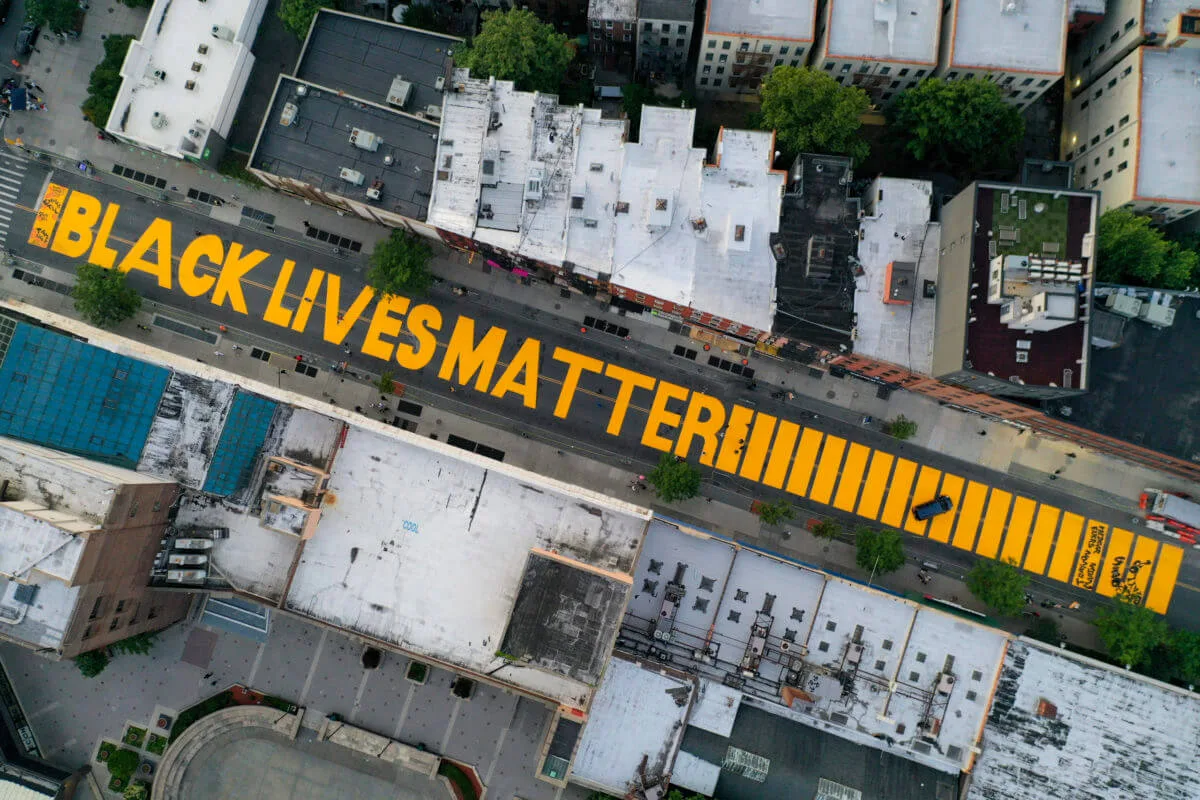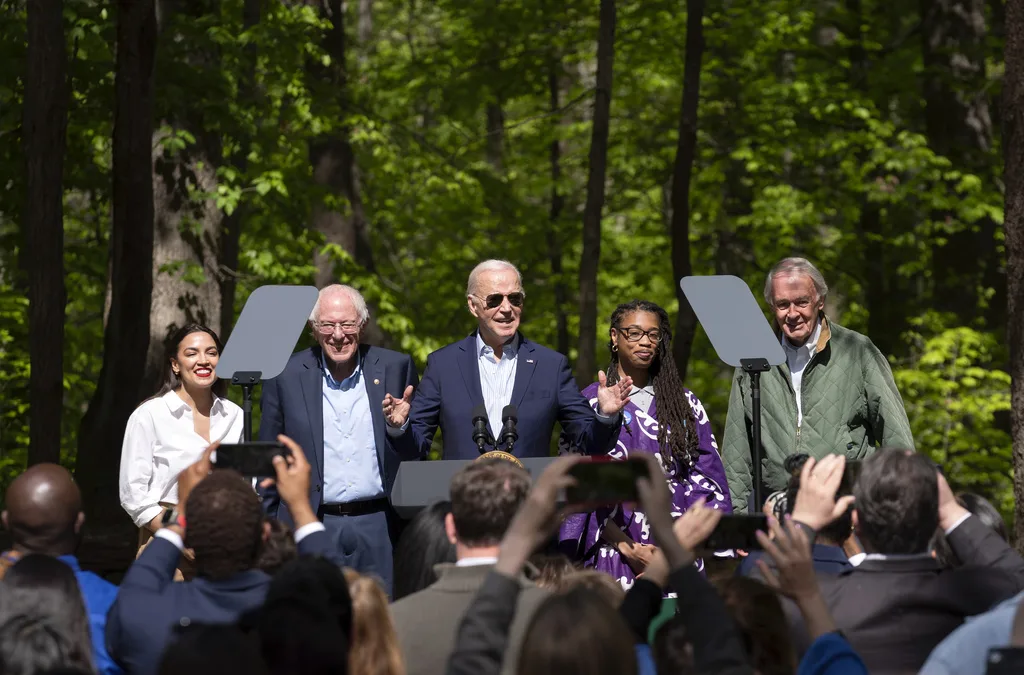
In this June 15, 2020, file photo, a giant "BLACK LIVES MATTER" sign is painted in orange on Fulton Street, Monday, June 15, 2020, in the Brooklyn borough of New York. (AP Photo/John Minchillo, File)
In honor of Juneteenth, we asked five racial justice activists about what steps Americans can take beyond protesting to push for changes in policing and achieve true racial justice.
Friday marks Juneteenth, a day of celebration commemorating when the enslaved people living in Galveston, Texas, finally received word of their freedom under the Emancipation Proclamation in 1865—more than two years after it was first issued by President Abraham Lincoln.
But even after Black people were freed from the bonds of slavery, they continued to endure racial violence and systemic racism, and have to this very day. More than 150 years after Black people became “free,” the fight for racial justice continues. Following the police killing of George Floyd on May 25, that fight has taken on increased urgency.
Americans are taking to the streets, protesting, and demanding change on an unprecedented level. Those calls for change will continue this weekend, as activists across the country are mobilizing to make this weekend not just one of celebration, but one of action.
Many activists believe the tide may finally be turning in the fight for racial justice, though they say whether that change comes is ultimately up to the people. With that in mind, COURIER asked five racial justice activists about what steps Americans can take in the coming weeks and months to push for changes in policing and achieve true racial justice.
Here’s what they had to say.
Take Advantage of This Moment and Think Big
“The most important thing that people can do with this moment is not squander this moment,” said Cat Brooks, co-founder of the Anti-Police Terror Project and executive director of the Justice Teams Network. “This is a continuation of a long fight against police violence, but we have an opportunity to extract some wins.”
What those wins look like, she said, will vary by community. In Oakland, where Brooks resides, she’s focused on defunding the police and reinvesting in the community.
Educate Yourself
One of the first steps in trying to achieve real change is to educate oneself, activists said.
Monique Joseph, a client advocate at Houston-based Restoring Justice, encouraged people to read up on the nation’s criminal justice system, recommending books like The New Jim Crow: Mass Incarceration in the Age of Colorblindness by Michelle Alexander.
RELATED: The Case to Make Juneteenth, the Realest Celebration of American Freedom, a National Holiday
She also suggested people try to find a way to incorporate anti-racism into their careers. “Everybody can’t have a career in criminal justice reform, but wherever you are, there is something you can do to make sure unconscious biases are addressed and anti-racism is addressed in your workplace,” Joseph said.
Claudia Rojas, co-director of the Chicago Taskforce on Violence Against Girls & Young Women, emphasized the importance of learning about the origins of law enforcement in the United States. “Are you familiar with the history of policing?” she asked. “If not, go to your local library, check out some books, learn about those histories and discuss it with your friends.”
Support Local Organizations
Activists emphasized the importance of supporting local organizations that are already engaged in this work.
“One thing that you can do is see who’s already doing work where you are,” said Ash-Lee Woodard Henderson, co-executive director of the Highlander Research and Education Center and leader in the of Movement for Black Lives. “Black-led organizations that are all over the country who are excited to welcome you into our country with open arms.”
Seft Hunter, the director of the Black Freedom Collective at Community Change, also encouraged people to support local organizations leading protests and other direct actions in their cities and towns. “If you can’t come out, you can also donate to one of these organizations for that matter. There are many ways that you can get involved,” he said.
But what if there isn’t an organization near you? Or what if you don’t feel comfortable with the ones you’ve found? Brooks had a direct answer to that: “If you can’t find one you like, start one.”
Learn More About City Budgets and Police Spending
There was also widespread agreement that learning about local police budgets was one of the best things people can do.
“You can learn about the budgeting process in your city and what is funded and what is left out,” Hunter said. “We know that oftentimes—when we look at these budgets—more than half of the resources are allocated toward public safety.”
In many cities, police department budgets are astronomical, far outstripping spending on other services. As Brooklyn College sociology professor Alex Vitale pointed out in an op-ed in the New York Daily News, “New York City spends more on policing than it does on the Departments of Health, Homeless Services, Housing Preservation and Development, and Youth and Community Development combined.”
RELATED: This Is What It Means to Defund the Police
By informing themselves, civilians can help influence those budgets and direct resources to social services other than policing. “We need to invest in things like mental health support, substance abuse prevention and treatment, clean communities, quality jobs, good schools—those are things you need to be advocating for right now,” Brooks said.
Henderson said these sorts of programs would reduce the amount of interactions people have with police in the first place. She also advised learning not just about the budget, but about the leaders who develop it. “Who is the person that’s creating the budget? Who are the people that are approving the budget?” she asked. “Call, email, tweet, Facebook at them and make sure they are divesting from police and are investing in our communities.”
Finally, Rojas said that once you educate yourself about the budgets, the best thing to do is to share that information with others. “Put together materials that you can distribute widely in your city, so that people know how much more money is going into policing versus things like schools and libraries.”
Volunteer Your Skills and Resources
Activists also said that people could get involved directly themselves by volunteering in some way.
“Think about your skill sets. Are you a doctor or a lawyer? Are you a scholar, a teacher or a cook?,” Rojas asked. “Reach out to organizations doing this work in your community and see if there’s a need for your skill sets.”
Joseph, meanwhile advocated for volunteering “your physical body and your finances” to organizations so they can continue to do their work.
Hold Elected Leaders Accountable
Protests and direct action are key, but so is holding elected officials accountable, activists said. After all, they’re the ones who write the budgets and the laws regulating policing.
Hunter encouraged people to contact their members of Congress “right now,” because of the various police reform proposals floating around the House and Senate.
“We’re having a conversation around ‘How do we actually deploy federal resources? How do we actually get to a place of consistent standards across policing across the country?’” Hunter said. “You can add your voice to that conversation by reaching out to your elected official and letting that official know that you’re demanding changes and accountability right now to make the system more equitable and to make the system more just.”
Henderson also emphasized the importance of pressuring lawmakers, adding: “Hold electeds accountable to the demand that we want more resources going into making our communities great.”
Step Up
Ultimately, it all comes down to stepping up. For Joseph, that means intervening when police might be harassing a Black person.
“If you see a Black person being pulled over by a police officer, you stop your car, and you get out and you record,” she said. “I think it’s important that we have each other’s back. We have been advocating for these changes locally and we feel like we’re being ignored, so I think it’s our responsibility as a community to make sure that we have each other’s back and we’re there to record and take note of what’s happening in these injustices.”
Hunter took a more high-level approach to his final suggestion, encouraging everyone to take ownership of their place in this society. “This is our democracy and we gotta fight for it. We gotta work to create it to make it more just and to make it more equitable,” he said. “So whatever you do, get involved.”
Politics

Influencers and creators find new ways to engage young Philadelphia voters
Rec Philly, a space for creators and influencers, teamed up with Show Up Strong to get hundreds of young Philadelphia residents engaged in the...

New Biden rule protects privacy of women seeking abortions
Under the new rules, state officials and law enforcement cannot obtain medical records related to lawful reproductive health care with the goal of...

Biden marks Earth Day by announcing $7 billion in solar grants
The Biden administration on Monday announced the recipients of its Solar For All Program, a $7 billion climate program that aims to lower energy...
Local News

Conjoined twins from Berks County die at age 62
Conjoined twins Lori and George Schappell, who pursued separate careers, interests and relationships during lives that defied medical expectations,...

Railroad agrees to $600 million settlement for fiery Ohio derailment, residents fear it’s not enough
Norfolk Southern has agreed to pay $600 million in a class-action lawsuit settlement for a fiery train derailment in February 2023 in eastern Ohio,...






